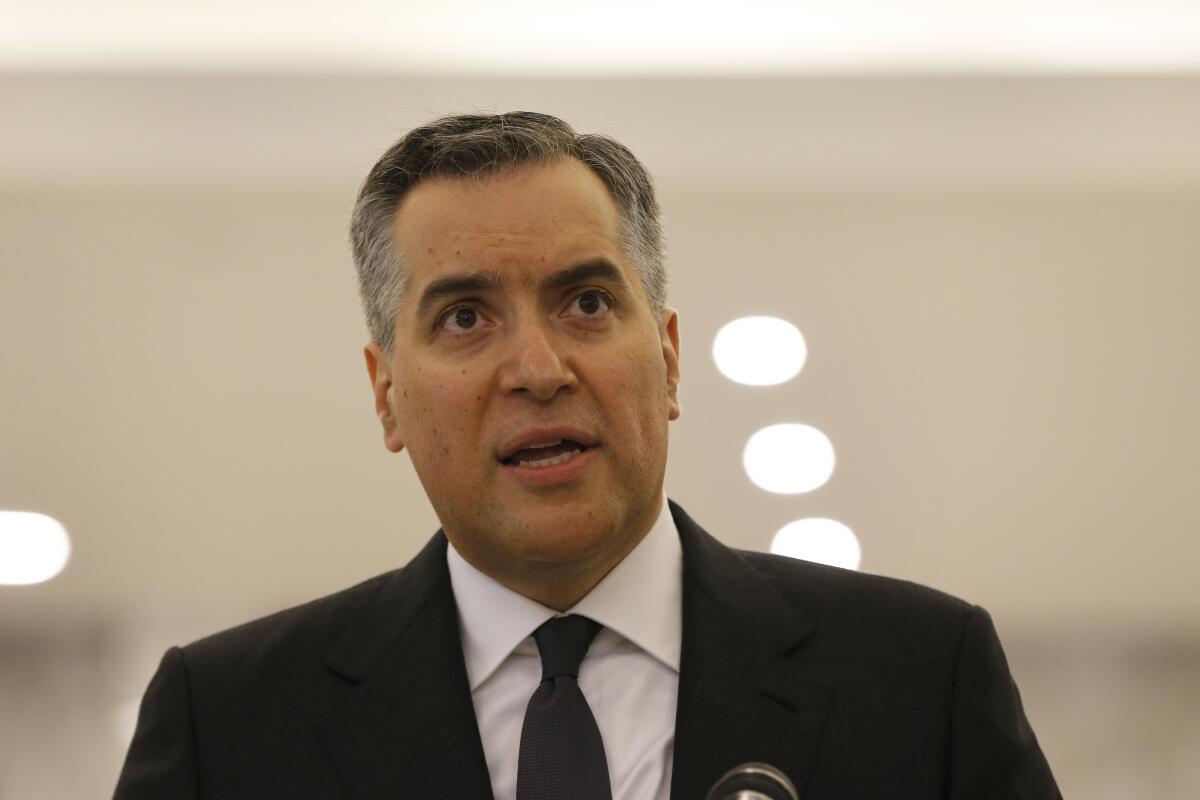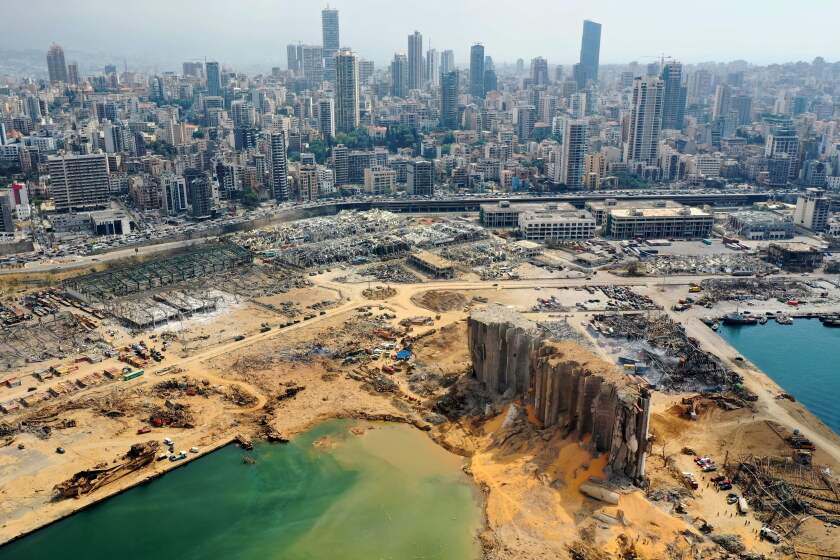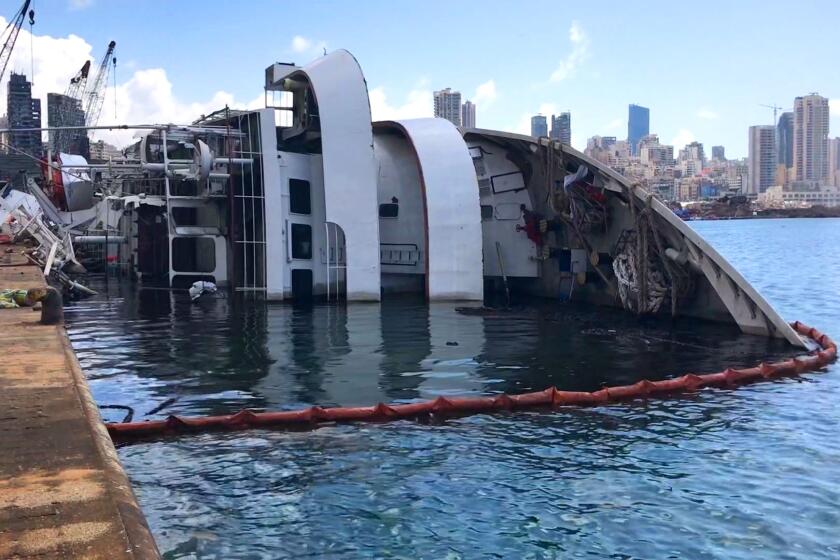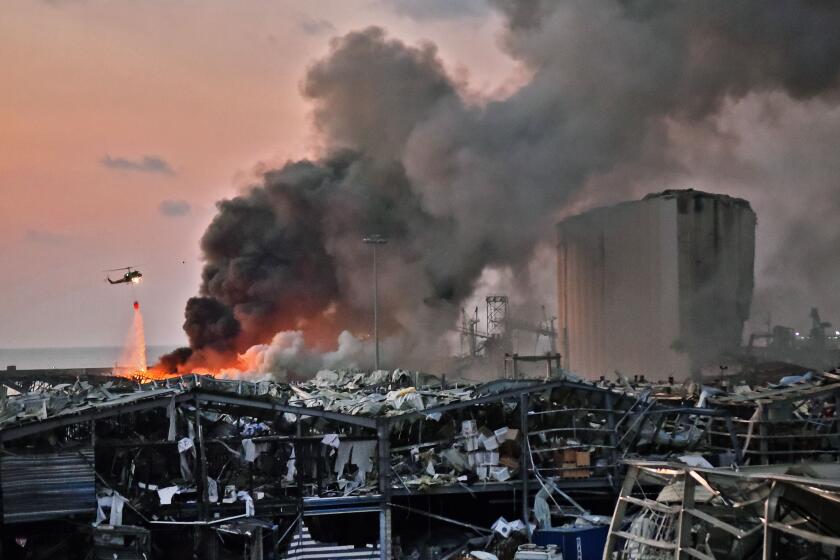Lebanon’s new prime minister, a little-known diplomat, vows reforms

- Share via
BEIRUT — Mustapha Adib, Lebanon’s new prime minister-designate, called Monday for a new government to be formed “in record time,” pledging to speed up the investigation into the massive Beirut explosion and to implement reforms in the crisis-hit country.
Adib, Lebanon’s ambassador to Germany, won the backing of major parties to become the next premier, with 90 votes of support among the legislators in the 128-member parliament. He spoke to reporters shortly after the president formally appointed him to put together a new government.
The breakthrough came hours before French President Emmanuel Macron was due to arrive for a two-day visit, during which he is expected to press Lebanese officials to formulate a new political pact to lift the country out of its multiple crises, including a collapsing economy and the Aug. 4 explosion in Beirut. At least 190 people died and 6,000 were injured in the blast, which devastated the city’s port and caused widespread damage to residential and commercial areas in the capital.
The government resigned en masse less than a week after the blast, which was caused by the ignition of nearly 3,000 tons of ammonium nitrate that had been stored for six years in a port warehouse.
In his first move after being appointed, Adib visited the historic neighborhood of Gemmayzeh, one of the areas hardest hit by the explosion, and chatted with residents — something that no other Lebanese politician has done.
“There are no words to express this frightening scene,” Adib said. The reaction was mixed, with some chanting, “Revolution, revolution!” and demanding to know how he could be an independent prime minister when he was chosen by political parties.
In Lebanon, a country scarred by civil war and its role as a geopolitical pawn, the official explanation behind the Beirut explosion is just one of many.
“We want the truth, and if you are not going to work for the truth, then we don’t want any of you,” a man told Adib as the ambassador walked among the people, surrounded by a handful of guards.
Adib said he wanted to form a government in record time so that the investigation into the blast could be conducted faster. After he left in his car, some in the crowd chanted, “Adib is one of them!” — referring to Lebanon’s ruling class.
Earlier, at the palace, Adib told reporters he would choose a Cabinet of experts and work with parliament to “put the country on track to end the dangerous financial, economic and social drainage.”
“The opportunity in front of our country is narrow, and the mission that I accepted is based on all political groups realizing that,” he said. “Reforms should be carried out immediately through an agreement with the International Monetary Fund,” he added without elaborating.
Restoring historic districts badly damaged in the Beirut blast will be a tall order given Lebanon’s weak economy and developers’ eagerness to move in.
Macron and other world leaders, as well as the IMF, have refused to give assistance to Lebanon before it enacts major reforms. The swift consensus around Adib, who has little name recognition, signaled a sense of urgency by Lebanon’s traditional politicians to try to contain the country’s rapidly worsening economic and financial crisis and show movement ahead of Macron’s visit.
Adib, who returned from Germany to Lebanon on Saturday, was the only name to emerge as a favorite for the post of prime minister, who, according to Lebanon’s sectarian-based power-sharing system, has to be a Sunni Muslim. The candidate who gets the most support is asked to form the new Cabinet, but Lebanon’s divided political class has often been bogged down over who holds senior posts and key ministries.
Adib was named by four former prime ministers on the eve of Monday’s consultations.
Earlier Sunday, the head of the powerful Hezbollah militant group, Hassan Nasrallah, said his supporters would cooperate and facilitate the formation of a government that would be able to improve economic conditions and undertake major reforms.
Los Angeles Times reporter Nabih Bulos was less than 500 yards from the center of the massive explosion in Beirut. He lived to tell the tale
The Iran-backed militant group, which has a dominant role in Lebanon’s politics, has come under intense criticism and public scrutiny as the country faces multiple devastating crises. Hezbollah and its allies also named Adib.
Even before the explosion, an unprecedented economic crisis had already sapped the Lebanese currency of more than 80% of its value, driving unemployment, poverty and inflation through the roof. Coronavirus infections and related deaths have also spiked, pushing authorities to reintroduce some restrictions on economic and social activities that have largely been ignored amid the slump.
Adib, who has been Lebanon’s ambassador to Germany since 2013, served as an advisor to one of Lebanon’s former prime ministers, Najib Mikati. He took part in the committee in charge of writing Lebanon’s new electoral law in 2005 and 2006, and acted as chief of Cabinet in 2011.
The 48-year-old is a native of the northern city of Tripoli, holds a PhD in law and political sciences, and taught in universities in Lebanon and France.
More to Read
Sign up for Essential California
The most important California stories and recommendations in your inbox every morning.
You may occasionally receive promotional content from the Los Angeles Times.
















